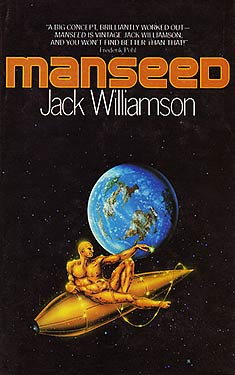Jack Williamson
Completed 1/7/2018, reviewed 1/7/2018
2 stars
Yes, this title of this book sounds like gay porn. It’s partly why I bought it, it made me laugh. The other part though was because I had only
read one other book by this Grand Master of SF, Darker Than You Think, which I
really enjoyed. Unfortunately, this book
wasn’t nearly as entertaining, and dragged in parts. It had a great concept but never grabbed
me. And the ending was quite uninspired.
The book is about a group of people who send out hundreds,
maybe thousands of small spacecrafts looking to seed new earths with human DNA. When found, a spacecraft will land and begin
populating the planet with cloned humans.
The humans are derived from the group of people who put this project
together, hoping to have enough diversity to create an actual new population of
earthlings on these new planets. They
see it as the only way humanity will survive. The spacecrafts can also spawn Defenders,
cybogs based on the best of the best of the people on the project. These Defenders can help the spacecraft in
time of trouble, like when one gets hit by a micro-meteor, or help the humans
being created on the new planet. This
story follows one such spacecraft and its Defender.
As I noted initially, the concept sounded great: seeding the galaxy with humanity by cloning
humans once the spacecraft arrives at a new planet. It allows for the spaceship to be much
smaller than a whole generations ship which would have to carry a diverse
enough population to start a human colony.
Even the Defender was intriguing, a golden cyborg based on the minds of some
of the greatest scientists on earth, which could make human decisions or take
human actions when the ship or the colony needed help. Of course, the decisions and actions would be
based on the real-life experiences of the people from whom the cyborg was
created, so there would be flashbacks illuminating the history of the mission.
Unfortunately, I thought the characters were pretty
cardboard. There was not much character
development at all. The brains of about
five men went into the creation of the first Defender, and almost all of the focus
is on Don Brink, the mercenary soldier and only non-scientist in the elite
group, and his relationship with the only female character of note, Megan Drake. Their relationship, or rather, their lack of
a consummated relationship on Earth plagues the Defender through many of his
decisions. It becomes more troublesome when
Defender Two is created and she’s the spitting image of Megan. She even tells
him she loves him, blah, blah, blah. But
she has genitals and the Defender, now known as Defender One, doesn’t. So they still can’t consummate their
relationship. It gets pretty soapy.
The bouncing timeline gets pretty annoying as well. Defender One has a decision to make or comes
across some kind of circumstance and it throws him into a recollection of one
of the five men in his head. It got occasionally
confusing at times who he was referring to in the past. This was a major criticism of other reviews I
read, although I thought it wasn’t quite that difficult.
There were also some plot holes. The most noticeable one to me was that
Defender One was created without genitals or wings. However, Defenders Two and Three had
them. The wings were intended to be
solar radiation collectors, that being one of the ways a cyborg can be
recharged. Later in the book, Defender
One somehow grows a pair of wings himself for collecting solar energy, although
it’s not explained very well. I think it
was something the spacecraft was able to do for him when he was hooked up to it
with his umbilical cord. Well, if he
could grow wings, why couldn’t he grow genitals? There is never an explanation of why Defenders
Two and Three have them, so why can’t Defender One have them? But probably the ultimate question for me was,
why are genitals even an issue, other than to create existential angst for
Defender One? His constant moaning about
not having them eventually became irritating.
I was really disappointed with the ending too. No spoilers, but it rather felt like Williamson
didn’t have an ending. He started to
throw some things in that didn’t really make sense, but tied up some loose
ends, and then stopped writing.
I’m giving the book two stars out of five. It’s not bad, it’s just not very good.

No comments:
Post a Comment